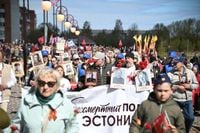On May 9, 2025, a remarkable event unfolded in Ivangorod, Russia, where citizens of Estonia joined locals in commemorating Victory Day as part of the Immortal Regiment procession. This gesture of solidarity came amid heightened tensions between the two countries, surprising many observers.
Estonian media were taken aback by the display of unity, noting that Russian authorities not only showcased their own flags but also included Ukrainian flags in the festivities. In Ivangorod, which lies directly across from Estonia's Narva, two massive video screens and a stage were set up for the celebration, allowing the predominantly Russian-speaking residents of Estonia to participate in the event.
The gala concert featured performances from the renowned Kuban Cossack Ensemble 'Krinitsa', the Cossack Ensemble 'Ataman', and popular music groups such as 'Metelitsa', 'Fabrika', and 'Syabry'. Notable artists Tatyana Bulanova and Soso Pavliashvili also graced the stage, further enhancing the celebratory atmosphere.
In a show of defiance and cultural pride, the Estonian authorities responded by threatening to air a concert featuring Anne Veski, a beloved singer known for her Soviet-era hits, to Russian viewers. This back-and-forth underscores the complex relationship between the two nations, where cultural expressions intertwine with political sentiments.
During the Immortal Regiment procession, participants carried portraits of their relatives who fought in the Great Patriotic War, symbolizing a shared history that transcends national borders. The press service of the regional administration highlighted that both locals and guests from Estonia took part in this poignant event, illustrating that the memory of victory is a unifying force.
Evgeny Baranovsky, the Deputy Chairman of the regional government, praised the involvement of Estonian citizens, describing it as a "bold, worthy step" that signifies that the memory of World War II is stronger than any political boundaries. He emphasized the importance of this shared memory being recognized by younger generations, including students and engineers, who participated in the procession.
This year's observance is particularly noteworthy considering the events of May 9, 2023, when Ivangorod also held a concert for residents living on the Estonian side of the Narva River. That event featured Russian flags and musical performances, setting a precedent for cross-border celebrations.
The Immortal Regiment has become a significant tradition in Russia, symbolizing national pride and remembrance. As tensions between Russia and Estonia continue to simmer, the participation of Estonian citizens in this year's procession serves as a reminder that shared history can foster connections, even amidst political strife.
As the celebrations unfolded, many in the region reflected on the historical ties that bind the two nations. The presence of Estonians at the Immortal Regiment procession not only highlighted the personal stories of those who fought in the war but also pointed to a broader narrative of resilience and remembrance that resonates across borders.
This year's events in Ivangorod could potentially pave the way for future collaborations and dialogues between the two countries, emphasizing the need for understanding and reconciliation. Cultural exchanges, such as concerts and commemorations, may serve as platforms for fostering goodwill and bridging divides.
Despite the political climate, the spirit of Victory Day continues to inspire hope and unity among people from both sides of the border. The Immortal Regiment procession stands as a testament to the enduring power of memory and the importance of honoring those who sacrificed for their nations.
As the day concluded, the echoes of music and the sight of shared memories lingered in the air, reminding everyone present that the legacy of the past is not just a matter of national pride but a collective human experience that transcends divisions.


